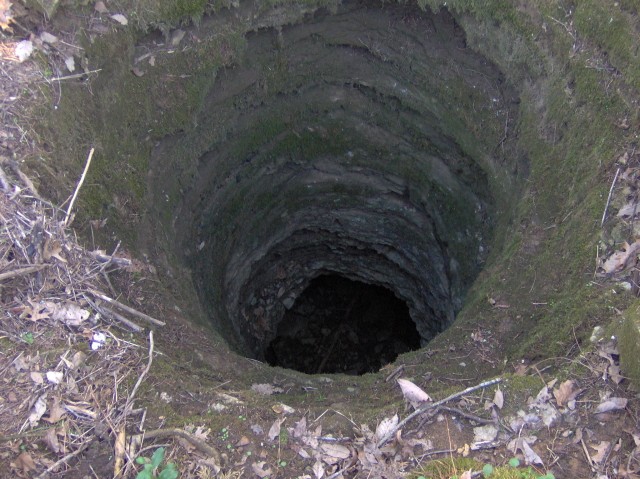A Sinkhole lot of Chemistry
 Wednesday, June 23, 2010 at 09:16AM
Wednesday, June 23, 2010 at 09:16AM  Sinkhole image by Brian StanberrySinkholes are in. There were reports of a massive one in Guatemala City a few weeks ago and now there are apparently dozens of them in China. Technically the hole in Guatamala City was not really a sinkhole, because it wasn’t made the right way. The “right way” involves a bit of chemistry. More . . .
Sinkhole image by Brian StanberrySinkholes are in. There were reports of a massive one in Guatemala City a few weeks ago and now there are apparently dozens of them in China. Technically the hole in Guatamala City was not really a sinkhole, because it wasn’t made the right way. The “right way” involves a bit of chemistry. More . . .
What I Cannot Create, I Cannot Understand
 Saturday, May 29, 2010 at 04:28AM
Saturday, May 29, 2010 at 04:28AM  First steps on the way to creating new organisms: transmission electron micrographs of Mycoplasma mycoides JCVI-syn1."What I Cannot Create, I Cannot Understand" is a quote from Richard Feynman. I don't know when first heard this quote, but I heard it most recently when Craig Venter was announcing their new "synthetic life" (Venter actually said "What I Cannot Build, I Cannot Understand, so I'm not sure which is the more accurate quote). As well as the genetic coding needed for the organism to live and function, Venter's team added 4 codes or messages in their new bacterial genome, including the names of 46 scientific contributers, and url and several quotes.
First steps on the way to creating new organisms: transmission electron micrographs of Mycoplasma mycoides JCVI-syn1."What I Cannot Create, I Cannot Understand" is a quote from Richard Feynman. I don't know when first heard this quote, but I heard it most recently when Craig Venter was announcing their new "synthetic life" (Venter actually said "What I Cannot Build, I Cannot Understand, so I'm not sure which is the more accurate quote). As well as the genetic coding needed for the organism to live and function, Venter's team added 4 codes or messages in their new bacterial genome, including the names of 46 scientific contributers, and url and several quotes.
This idea of understanding by creation/construction is the real value of what Venter and his team have achieved. I'm sure that in the future there will be a demand for "designed" or synthesized organisms, but at this pont it is what we can learn about life, gemonics, protemics, epigenetics, etc that is of immediate interest. Even Venter described the achievement of a synthetic genome as a "baby step", but let's not forget how important a bab's first steps are. Exciting times indded.
 Chris KP |
Chris KP |  2 Comments |
2 Comments | Aussie animals and anitbacterial activities
 Thursday, May 6, 2010 at 06:49AM
Thursday, May 6, 2010 at 06:49AM  Photo by Niall KennedyA few years ago it was crocodiles and now it's platypus that might hold the key to new antimicrocial compounds. Consider that when they hatch, baby platypus are blind, hairless, helpless and about and a half centimetres long. They are born like this into a borrow, so it stands to reason that they must have some sort of antimicrobial assistance.
Photo by Niall KennedyA few years ago it was crocodiles and now it's platypus that might hold the key to new antimicrocial compounds. Consider that when they hatch, baby platypus are blind, hairless, helpless and about and a half centimetres long. They are born like this into a borrow, so it stands to reason that they must have some sort of antimicrobial assistance.
Researchers at Victoria's Department of Primary Industries (DPI) have isolated, synthesised and tested several platypus proteins revealing powerful antipmicrobial compounds. The researchers have mooted the possibiity of using these new compunds to combat "superbugs" (eg Methicillin-resistant Staphylococcus aureus) or to fight methane-producing bactiera in the guts of cattle.
Taking on golden staph and tackling climate change - platypus are cool.
Oh, regarding the crocodiles, Great Big Science Gig have a nifty song about them.
SciKu
 Thursday, April 29, 2010 at 06:30AM
Thursday, April 29, 2010 at 06:30AM For a few moments there I thought I'd invented SciKu (science-inspired haiku). Apparently I did not invent it, but now that I've discovered it, I keep creating new ones. Here's a few that came to me today. I suspect others will follow . . .
Tilted as we spin
Roughly 23 degrees
Seasons come and go
A useful sequence
I would like to make some more
Bring on PCR
Photons from the sun
H2O and CO2
Photosynthesis
Once one of the nine
Pluto joined the Kuiper belt
A planet no more
A special number
Not in any times table
It must be a prime
Hoopy Robots Who Really Know Where Their Towels Are
 Tuesday, April 6, 2010 at 07:52PM
Tuesday, April 6, 2010 at 07:52PM Researchers at University of California Berkeley have deveoped a robot that folds towels. Jeremy Maitin-Shepard and Pieter Abbeel and their team undertook this challenge because the robots need to perceive and manipulate "deformable objects". Towels are floppy, so their shape isn't predictable. The robots need to be able to observe the shape and position of the towel when they pick it up, before deciding on the best approach to folding it. There is also the chance that Jeremy and Pieter simply thought of this on washing day. Hopefully they did some washing the traditional way while they worked on perfecting the robot's skills. This video has been sped up 30 times, but it's still impressive stuff.
